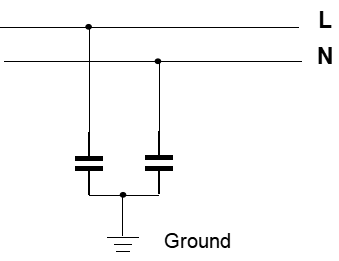I recently contacted EPEVER support concerning their UP5000-HM8042 hybrid inverter with the following question:
"The inverter will be used completely off grid with no mains power connection.
Can you send me a circuit diagram to show how the system should be earthed please?"
The reply was:
"Actually, we only recommend grounding the housing of your inverter, you can not grounding anyelse parts in your system. Especially the netural line, please do not grounding the Utility and AC Output netural line."
Surprised (because there is no mention of this anywhere in the manual and expecting that there should be a neutral-ground bond), I looked for more clarification, especially in relation to the neutral-ground bond issue and received the following:
"To prevent common-mode interference. The AC output terminal of the inverter designed with a safety capacitor (referred to as Y capacitor). The ground wire is the common point between L and N affected by the Y capacitor. The voltage between L or N to the ground is 110VAC. The Y capacitor meets safety requirements. So usually, human exposure to one of the root won’t result in electrical shock."

My question is, does anyone have any experience of inverters with floating neutrals? Are they safe if the ac output is fed to the distribution panel (fuse board) of the house?
(The set up is entirely off grid. There is no utility connected to the house. There is an earth rod. The existing inverter (MppSolar) has a neutral-ground bond)
"The inverter will be used completely off grid with no mains power connection.
Can you send me a circuit diagram to show how the system should be earthed please?"
The reply was:
"Actually, we only recommend grounding the housing of your inverter, you can not grounding anyelse parts in your system. Especially the netural line, please do not grounding the Utility and AC Output netural line."
Surprised (because there is no mention of this anywhere in the manual and expecting that there should be a neutral-ground bond), I looked for more clarification, especially in relation to the neutral-ground bond issue and received the following:
"To prevent common-mode interference. The AC output terminal of the inverter designed with a safety capacitor (referred to as Y capacitor). The ground wire is the common point between L and N affected by the Y capacitor. The voltage between L or N to the ground is 110VAC. The Y capacitor meets safety requirements. So usually, human exposure to one of the root won’t result in electrical shock."
My question is, does anyone have any experience of inverters with floating neutrals? Are they safe if the ac output is fed to the distribution panel (fuse board) of the house?
(The set up is entirely off grid. There is no utility connected to the house. There is an earth rod. The existing inverter (MppSolar) has a neutral-ground bond)




































































